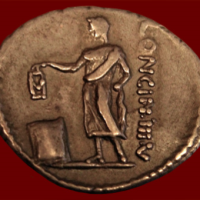There’s an overcurrent above the heavens known only to God and it produces an undercurrent of faith and hope–invisible in the human heart–yet on full display in a faithful Christian’s life.
Making the Theological Understandable
There’s an overcurrent above the heavens known only to God and it produces an undercurrent of faith and hope–invisible in the human heart–yet on full display in a faithful Christian’s life.
Can I get a witness?
 If there’s one big lesson from today’s message it would be this: Be prepared so that when God asks you “Can I get a witness?” your answer can be a resounding “Yes”!
If there’s one big lesson from today’s message it would be this: Be prepared so that when God asks you “Can I get a witness?” your answer can be a resounding “Yes”!
Can I get a witness? The answer in today’s passage (Acts 22:30-23:11) would be three-fold: “Apparently not, Yes, and Yes again.” Last week, Paul was sent by the Roman commander into the barracks and ordered to be flogged until Paul’s citizenship of Rome made that form of questioning impossible, not to mention illegal.
The commander still wants to know what’s going on—why all the unrest among the populace—so he figured, it must be a religious matter for all those Jews. He brings Paul before the Sanhedrin (the governing Council of the Jews) to stand trial on religious grounds.
Religious problem, religious solution. Seemed pretty reasonable.
But can I get a witness? Apparently not.
So Paul the defendant was having to testify against himself. This wasn’t legal in a fair trial, but the Sanhedrin wasn’t too concerned. Why should they be? They weren’t concerned about a fair trial with Jesus (whom they handed over to be crucified by the Romans), or with Stephen (whose angel face and stellar defense made their guilt obvious, so they stoned him), so why should they care about a fair trial with Paul? Don’t have any real witnesses? No problem. Just make Paul testify.
Can I get a witness? Yes, Paul would witness to them and they’d get more than they’d bargained for.
Acts 22:30 The next day, since the commander wanted to find out exactly why Paul was being accused by the Jews, he released him and ordered the chief priests and all the Sanhedrin to assemble. Then he brought Paul and had him stand before them.
Acts 23:1 Paul looked straight at the Sanhedrin and said, “My brothers, I have fulfilled my duty to God in all good conscience to this day.”
A one-line defense argument, but what a line it is! Paul testified that he has fulfilled his duty to God (that is, preaching the Good News among the Gentiles).
This went over like a lead balloon with the Sanhedrin and the high priest Ananias (who by the way, isn’t the same Ananias as the guy who fell over dead in Acts 5 along with his wife Sapphira, or the same Ananias as the guy who was told Paul was the chosen instrument to witness to the Gentiles and told Paul to receive his sight). Ananias was a pretty common name.
2 At this the high priest Ananias ordered those standing near Paul to strike him on the mouth.
Paul speaks a one-line defense, saying that he’d done his duty to God…and then the high priest Ananias orders an illegal action: the striking of an accused man before he’d received a trial. History repeats itself. It happened to Jesus in His trial before the Jewish religious officials and with the Roman authorities, and now it’s happening to Paul at his trial.
What you’re about to hear in the next 3 verses may be among the most… confusing… uncertain… or perhaps selectively ignored things in the Bible. Bible commentators, those people who devote their lives to extended study of Scripture and write books about it, have developed a consensus view that they all repeat to themselves. But as a mother, I’ve learned that no matter how many times my teenagers told me something that didn’t quite add up, repeating it with emphasis or increasing volume or energy, still didn’t make it true. If it doesn’t add up, it doesn’t add up. The consensus view of these 3 verses doesn’t add up:
3 Then Paul said to him, “God will strike you, you whitewashed wall! You sit there to judge me according to the law, yet you yourself violate the law by commanding that I be struck!”
4 Those who were standing near Paul said, “You dare to insult God’s high priest?” 5 Paul replied, “Brothers, I did not realize that he was the high priest; for it is written: ‘Do not speak evil about the ruler of your people.'”
 When I first organized this sermon series, I was worried there wasn’t going to be much to build a sermon on. But as I began to research it, I discovered there’s a lot here. And many commentators and theologians say that what just happened was that Paul, stressed out from nearly being torn to pieces by the crowd and put in jail, nearly flogged, and then forced to testify against himself before the Sanhedrin…well, he loses his cool and shows a “rare display” of his sinful humanity.
When I first organized this sermon series, I was worried there wasn’t going to be much to build a sermon on. But as I began to research it, I discovered there’s a lot here. And many commentators and theologians say that what just happened was that Paul, stressed out from nearly being torn to pieces by the crowd and put in jail, nearly flogged, and then forced to testify against himself before the Sanhedrin…well, he loses his cool and shows a “rare display” of his sinful humanity.
Oh, they give all kinds of reasons. Paul’s eyesight was really bad from the blinding light and the scales on his eyes. He couldn’t see! The high priest was a different one than he’d dealt with before. He didn’t know there had been a change. He was superficial and confused because he was looking for a guy dressed like the high priest. All kinds of excuses. Why? Because theologians are quick to remind us that when Christ was struck upon the mouth, He did not retaliate or say anything troubling. Paul didn’t do that and therefore Paul sinned. But we hold Paul in high regard, so we’ll come up with good excuses to make his sin seem less sinful and turn his words into an apology. That’ll do it.
While that particular instance with Christ is true because Scripture says so, my instincts are to believe that, with Paul, an apology doesn’t quite add up.
Regarding our passage today, I believe theologians and commentators are too quick to dismiss the uncomfortable and hard-to-justify. Simply brushing it off as,
Oh well, just goes to show Paul was human and imperfect like the rest of us. He must apologize!”
Yes, Paul was human, not superhuman, but I don’t find that brushing it off squares with the rest of the Bible or with how things were in the culture of Paul’s day. It’s a convenient dismissal of something they’re embarrassed about and what it does is, it robs the passage of some of its power. Just pass it off as sin. When instead it’s great witnessing.
Can I get a witness? Yes! And Paul is the best.
Have these commentators misunderstood the mind of a man like Paul or the powerful impact of his having seen the last of the Resurrection appearances of our Risen Lord, or the clear commission—from God Himself–to go and preach to the Gentiles when it wasn’t exactly on Paul’s radar? Surely these commentators have never–in or out of the body–been carried into the third heaven and given a thorn in the flesh like Paul tells us about (2 Cor 12:2). They probably have never been in the suffering shoes or sandals of one who has the gifts of a prophecy and exhortation and the clear call from God to use it. One in the same personality mold as Amos or Elijah. Ones commissioned by God to share the very heart of God, both powerful love He has for us and also the immensity of wrath boiling away when God is continually confronted with a disobedient people…who had been given every opportunity and rejected Him over and over and over again.
So did I just blow off this consensus and stubbornly stick with my gut instinct? No.
In Congregational churches, we enjoy the understanding that we can think independently and come to our own theological conclusions. But in doing so, we must be careful how we interpret. While I was fine with going with my gut, I also began to dig deep to try to figure out why my gut was different than the party line of so many commentators. There is no shortcut through digging deep. And it takes time to do it. This week, lots of time. In doing this research, however, I found that I had a few friends among commentators …like John Calvin and F.F.Bruce who saw things similarly to how I am seeing things.
I’ve concluded that in these 3 verses, Paul was witnessing to many things and if all these commentators see is the hothead Paul losing his cool, sinning, and apologizing, they don’t see what I see. Maybe they see themselves in Paul, their own anger issues…their own nasty jabs…their own need for repentance, or their wimpy tuck-tail-and-run tendency. Yes, there’s wisdom in holding one’s tongue unless God is asking “Can I get a witness?” Paul’s answer was Yes!
He was a witness for the whole of Scripture.  We cannot rely on one verse alone, but must consider Scripture as a whole in all its detail. In the whole span of Scripture, Paul’s technique may appear rough around the edges, but there’s plenty of biblical precedent, even in the NT and from Jesus Himself. Paul would have known what Jesus said even if Paul’s primary written Scriptures would have been our Old Testament. Why? Because in a little tiny verse of Galatians, Paul explains how he knows what he knows:
We cannot rely on one verse alone, but must consider Scripture as a whole in all its detail. In the whole span of Scripture, Paul’s technique may appear rough around the edges, but there’s plenty of biblical precedent, even in the NT and from Jesus Himself. Paul would have known what Jesus said even if Paul’s primary written Scriptures would have been our Old Testament. Why? Because in a little tiny verse of Galatians, Paul explains how he knows what he knows:
Galatians 1:12 I did not receive it from any man, nor was I taught it; rather, I received it by revelation from Jesus Christ.
Paul would have known from Jesus during Paul’s time in Arabia
Paul knew his Scriptures and this was one part of the backstory that commentators diminish to an unwarranted apology and in doing so, they strip Paul’s defense of its power. In the whole of Scripture, God held a low view of human rulers and criticizing them was something godly men were often called to do as witnesses by and for God. One verse doesn’t stand alone. Paul witnessed to the whole of Scripture and more than that though,
 Paul was a witness to his knowledge of the history of Judaism
Paul was a witness to his knowledge of the history of JudaismIn the history of Judaism, who were the rulers? They were prophets like Moses or priests like his brother Aaron. So is that why Paul owes the high priest an apology? Well, I don’t think so. There were no rulers except the priests from the house of Levi. Established by God. There was no king at that time but God…and rulers were only those serving Him faithfully. Deuteronomy 21:5 The priests, the sons of Levi, shall step forward, for the LORD your God has chosen them to minister and to pronounce blessings in the name of the LORD and to decide all cases of dispute and assault.
After the resurrection of Christ which proved His Messianic status, His Kingship, His Priesthood, and His divinity, who is the high priest? A man, or the Risen Lord? Paul witnessed to Jesus as High Priest and Ruler because Paul knew his history of Judaism and had seen it fulfilled in Christ.
 He was thoroughly trained as a witness to the Law.
He was thoroughly trained as a witness to the Law. So Paul quotes only part of Exodus 22:28 to the high priest Ananias. The punch from Paul wasn’t in what he said, but it what he didn’t say.
He quoted, “Do not speak evil about the ruler of your people.“
Ananias was presumably trained enough to know the full verse: “Do not blaspheme God or curse the ruler of your people.” (Exodus 22:28 )
Details in the Bible are there for a reason. Paul quotes only part of that verse leaving the convicting part as a fill-in-the-blank for Ananias. You see, the high priest heard Paul’s one-line defense of doing his duty and judged it as blasphemy worthy of being struck in the mouth. But God was on Paul’s side. The high priest had presumed to know and judge better than God. Being above God. And that’s blaspheming God.
So which is the greater crime: blaspheming God or pointing out the hypocrisy and miscarriage of justice by a man who had been appointed by Rome and was a political operative Sadducee? The legitimacy of the high priest Ananias was questionable first because he was appointed by Rome, and he assumes he knows better than God, but also…
For Ananias to order Paul to be struck in the mouth was a miscarriage of justice, striking the accused, violating all kinds of Law including, Exodus 23:1 “Do not spread false reports. Do not help a wicked man by being a malicious witness. 2 Do not follow the crowd in doing wrong. … 7 Have nothing to do with a false charge and do not put an innocent or honest person to death, for I will not acquit the guilty.”
All this to say that Paul knew the Law and that the high priest wasn’t following it. F.F. Bruce says that Paul’s statement in verse 5 Paul replied, “Brothers, I did not realize that he was the high priest; for it is written: ‘Do not speak evil about the ruler of your people.'” Could easily carry the meaning: I did not think that a man who behaved so illegally [as to order him to be struck across the mouth] could possibly be the high priest.
 And finally, Paul was a witness to his times.
And finally, Paul was a witness to his times.The kings named Herod were client kings of Rome and not godly. They were of Arab and Idumean (Edomite) descent and influenced by Rome which appointed them to be a dynasty of kings who appointed high priests—high priests who were Sadducees, political appointments for political suck-ups to Rome and its client kings.
This was politics, really, and not God-honoring religion at its very heart.
We won’t look at it in detail this week but now Paul changes the topic to the Pharisees and the Resurrection which was a defining disagreement with the Sadducees. It’s not Paul doing a diversion tactic because Plan A didn’t work. Doing some fancy footwork to avoid being sacked behind the line of scrimmage.
Why did Paul change the topic to the Resurrection? It was key to Paul’s understanding of Jesus as both King and High Priest.
Politically, Paul affirmed the Pharisees against the Sadducees who began to argue. Paul knew the Resurrection happened and the empty tomb makes a difference, even in a political culture.
I don’t really care what some commentators might say about my view of this. Paul’s words about God striking the high priest were probably not the “rare display of sin” and the “human reaction” of a hot head. Why? Because the words were, in fact, prophetic and true. Josephus tells us that not long afterward, Ananias’ wickedness caught up with him and he was struck down by his own people during a revolt.
All this history may seem like fishing in a bunch of weeds. Maybe it’s all fine and good, but you’re wondering, what does it mean for you and me?
It doesn’t mean we can go shooting off our mouths to authorities and be loose cannons rolling around the deck of the ship blowing holes wherever we feel like it. Being a great big ball of fire in search of a can of kerosene.
But it does mean that we can thoughtfully disagree, even with scholars. But our witness must show a thorough knowledge of Scripture, a deep understanding of the Law, the vast truth of our history, and an acute awareness and discernment of our times.
Be prepared ahead of time by knowing His Word, studying His Word, so that when God asks you,
Can I get a witness?” your answer can be “Yes and Yes again”. Amen?
“Can I get a witness?” In Acts 23, Paul would have to be his own witness. The high priest and the Sanhedrin would get more than they’d bargained for.
Some commentators, in fact quite a consensus, think we’re seeing a rare glimpse of Paul’s sinful humanity and an apology to the high priest. I think not. Paul is not superhuman, but his one line defense witnesses to many things. Take a listen and see what you think.
Dear friends and subscribers,
I wanted to let you know that I will resume normal posting beginning tomorrow. Over the past 10 days, my web site experienced a security issue which resulted in my web site being blacklisted by Google. Ours is unfortunately a day and age of malicious hacking. I want to apologize if there were any concerns you experienced about this being identified as suspect.
Upon hearing that my blog had been compromised, I immediately contacted Google Webmasters and my hosting company. I hired a security company to perform a thorough audit and my web site has been verified as clean during this time, but it does take a while for the blacklisting to go away. As you know, I don’t collect personal information and I don’t sell anything so there was nothing to be gained from this by anyone with malicious intent.
I did experience significant sadness and frustration, but I also received a word from God about His perfection and timing. And therefore I also have tremendous gratitude to God for His protective hand. I’m thankful this didn’t happen during my Advent devotional series, Incarnation, and now the security company will ensure that nothing interrupts this devotional favorite. I wouldn’t have this protection over this next phase of ministry had it not been for this experience. God is so good!
Thanks for understanding my absence during the past 10 days as I’ve worked my way through a process I never thought I’d be required to address as one tiny little person whose words go out with significance unknown to me this side of heaven. It will be good to feel free to bless people from God’s word again.
With gratitude for your friendship and understanding, Barbara <><

The entire series is available in the archives (right) beginning November 29, 2015.
Announcing this year’s Seminary Gal Advent devotional series: Incarnation.
Have you ever wondered exactly what the Incarnation is and why God did it?
In a series of 26 lessons, we will explore this most important event in Christian theology. If there are any specific questions you’ve had about the Incarnation, I’m giving some advance notice of this series so that you can send me your questions and I’ll address them. (Go ahead, stump me. Try anyway, it’ll be a new means of holiday cheer for even for those who don’t call the holiday Christmas).
This year, Advent begins November 29, 2015. If you’re already signed up on my Home Page sidebar to receive posts, you’ll get the Advent devotionals automatically. If you haven’t signed up, today is a great day to do so. Advent and Lenten devotionals remain among my most popular offerings. You don’t want to miss this great way to prepare your heart for the true meaning of Christmas!
Join me for Incarnation: The WORD Made Flesh.

Sorry for the repost on this. My web site has been experiencing technical difficulties and I needed to restore to an earlier version that was missing this post.
I’m away from the pulpit again this week as I continue to prepare the good folks in the congregation at Plymouth Church for my departure at the conclusion of the Book of Acts (in December). We have a guest preacher again this week as we pursue an orderly transition and learn Bible truths from other preachers and pastors. I thoroughly enjoyed the message offered this week by our guest.
However, to keep up with the study of Acts of the Holy Spirit and the Apostles online, I offer my own devotional on the topic (and again, there will be no accompanying audio this week).
It’s important that we don’t carry around notions based upon mistaken identity.
The Apostle Paul had his share of misunderstandings, some self-inflicted and others aimed directly at him. God, however, wants us to be seeing life with eyes wide open, being clear minded, knowing our role in our culture, and grounding our identity in Christ. When we see the question is not so much “Who am I?” but “Whose am I?” we will be free from mistaken identity and confident in sharing our Christian identity with others in the form of testimony. Lately people have been using a hashtag #IamAChristian to affirm their identity in Christ. That’s what Paul will be talking about today as he teaches us 5 aspects of mistaken identity in Acts 21-22. Mistaken identity that needed correcting if one will be a Christian.
Last week, the mob was about to kill Paul when he was hauled off to the barracks for questioning. The commander got it wrong, though.
Mistaken Identity #1. He’s not an Egyptian causing trouble. He’s a Jew through and through.
Acts 21: 37 As the soldiers were about to take Paul into the barracks, he asked the commander, “May I say something to you?” “Do you speak Greek?” he replied. 38 “Aren’t you the Egyptian who started a revolt and led four thousand terrorists out into the desert some time ago?” 39 Paul answered, “I am a Jew, from Tarsus in Cilicia, a citizen of no ordinary city. Please let me speak to the people.”
The commander was surprised to see that Paul speaks Greek and further surprised to learn that Paul was not an Egyptian at all but from Tarsus and a Jew, like the rest of the “Men of Israel” mob which was trying to kill Paul. Mistaking him for an Egyptian meant that the commander’s reason for taking Paul to the barracks was thrown into question. Paul was from Tarsus—moreover, he was a citizen of Tarsus which was no ordinary city. The commander didn’t really seem to be all that impressed with Tarsus, but it did alert him to the fact that he wasn’t dealing with the person he thought he was dealing with (an Egyptian insurrectionist and terrorist).
Therefore he lets Paul speak. Perhaps the commander thought that Paul was going to correct the record with the crowd. Maybe the “Men of Israel” thought Paul was an Egyptian too. Letting Paul speak, however, is always a dangerous thing. Not only is he a good speaker, but his logic is impeccable and his rhetorical skill is superb. He’ll give the Gospel full strength at every opportunity. So, Paul retells his conversion story that we first heard about in Acts 9. This time, Paul fills us in on a few more details. The crowd, those “Men of Israel,” may very well be surprised now to learn that Paul isn’t who they thought he was. Paul has some pretty amazing Jewish credentials.
Acts 22:1 “Brothers and fathers, listen now to my defense.” 2 When they heard him speak to them in Aramaic, they became very quiet. Then Paul said: 3 “I am a Jew, born in Tarsus of Cilicia, but brought up in this city. Under Gamaliel I was thoroughly trained in the law of our fathers and was just as zealous for God as any of you are today. 4 I persecuted the followers of this Way to their death, arresting both men and women and throwing them into prison, 5 as also the high priest and all the Council can testify. I even obtained letters from them to their brothers in Damascus, and went there to bring these people as prisoners to Jerusalem to be punished.
Mistaken identity #2. Paul is not some ignorant, mind-numbed cult follower of Jesus, but a highly educated and credentialed Jew of Jews.
He is a Jew and therefore calls them “brothers and fathers.” He spoke in Aramaic because that was their spoken language of choice. He was trained under Gamaliel, the foremost rabbi of their time. He was not just a student who skipped class perpetually, some lazy slacker who squeaked by with a D-minus. Nope. He was thoroughly trained and zealous as any of them. Actually Paul is being modest. He was zealous beyond the point that even they are. In fact, he was downright notorious for his persecution of Christians. He was feared by Christians throughout the region and he was known to the high priest and to the Council, the Sanhedrin, as he got letters from these leaders to hunt down, arrest, and kill Christians. Paul was a persecutor of Christians, and like ISIS today, Paul had that as his primary life’s ambition.
But Paul previously had a mistaken identity. #3 Paul thought that Christians were the infidels and Jesus was falsely worshiped. But then, something changed: Paul saw the Light.
 6 “About noon as I came near Damascus, suddenly a bright light from heaven flashed around me. 7 I fell to the ground and heard a voice say to me, ‘Saul! Saul! Why do you persecute me?’ 8 “‘Who are you, Lord?’ I asked. “‘I am Jesus of Nazareth, whom you are persecuting,’ he replied. 9 My companions saw the light, but they did not understand the voice of him who was speaking to me. 10 “‘What shall I do, Lord?’ I asked. “‘Get up,’ the Lord said, ‘and go into Damascus. There you will be told all that you have been assigned to do.’ 11 My companions led me by the hand into Damascus, because the brilliance of the light had blinded me. 12 “A man named Ananias came to see me. He was a devout observer of the law and highly respected by all the Jews living there. 13 He stood beside me and said, ‘Brother Saul, receive your sight!’ And at that very moment I was able to see him. 14 “Then he said: ‘The God of our fathers has chosen you to know his will and to see the Righteous One and to hear words from his mouth. 15 You will be his witness to all men of what you have seen and heard. 16 And now what are you waiting for? Get up, be baptized and wash your sins away, calling on his name.’
6 “About noon as I came near Damascus, suddenly a bright light from heaven flashed around me. 7 I fell to the ground and heard a voice say to me, ‘Saul! Saul! Why do you persecute me?’ 8 “‘Who are you, Lord?’ I asked. “‘I am Jesus of Nazareth, whom you are persecuting,’ he replied. 9 My companions saw the light, but they did not understand the voice of him who was speaking to me. 10 “‘What shall I do, Lord?’ I asked. “‘Get up,’ the Lord said, ‘and go into Damascus. There you will be told all that you have been assigned to do.’ 11 My companions led me by the hand into Damascus, because the brilliance of the light had blinded me. 12 “A man named Ananias came to see me. He was a devout observer of the law and highly respected by all the Jews living there. 13 He stood beside me and said, ‘Brother Saul, receive your sight!’ And at that very moment I was able to see him. 14 “Then he said: ‘The God of our fathers has chosen you to know his will and to see the Righteous One and to hear words from his mouth. 15 You will be his witness to all men of what you have seen and heard. 16 And now what are you waiting for? Get up, be baptized and wash your sins away, calling on his name.’
The companions saw the light too, but they were not blinded by it. No scales on their eyes. They didn’t understand the voice that spoke to Paul. Interesting, is it not, that people can see the very same thing…and yet, not understand what has happened? God must open our eyes to see the mistaken identity and we must be willing to take it to heart. Paul did.
Mistaken identity #4. Paul thought he was only persecuting Christians. He had no idea that he was actually persecuting the Christ, the long-awaited Jewish Messiah. The Jews had been waiting for this Messiah since the days of Abraham and now Paul is aware that he has been persecuting the very One he has been waiting for: it’s a case of mistaken identity on steroids.
We aren’t told about the companions. Did they have their eyes opened to the truth, too? Or did the Gospel cut both ways? Did they go away with nothing but a strange story and hard hearts?
From Damascus to Jerusalem, must have been a thinking journey for Paul. Working his way through all those Scriptures he knew by heart. All that training that he’d received. And now the Light of Christ illuminating it all and the Holy Spirit showing Paul the Truth and how much Paul himself was going to suffer for the cause of Christ.
What goes around comes around;
the hunter becomes the hunted;
and the persecutor becomes the persecuted.
17 “When I returned to Jerusalem and was praying at the temple, I fell into a trance 18 and saw the Lord speaking. ‘Quick!’ he said to me. ‘Leave Jerusalem immediately, because they will not accept your testimony about me.’
Mistaken identity #5. The crowd then thought that Paul was a false teacher. But Paul is an extraordinary evangelist to Jews and Gentiles alike. He’s teaching Truth, but now just as before, many will not accept it.
Now, Paul has come full circle, twice. He started in Jerusalem as a persecutor of Stephen (and Christ). On round one, Paul returned to Jerusalem as a Christian with work to do and needing to flee in order to accomplish it. But now, Paul is back in Jerusalem and they still do not accept Paul’s testimony about God’s plan of salvation, but the time has arrived that was bound to happen. The crowd has a mistaken identity just as Paul had at the time of Stephen’s death.
The difference is that now, Paul knows exactly who he is and moreover, he knows Whose he is. He belongs to Christ Jesus.
What about you? Who do you say Jesus is? Who do you think you are? Is your identity in all the credentials and the pedigree…or is your identity as one who has been redeemed? Are you living in a case of mistaken identity… or have you seen the Light? Are you living with your eyes open wide? Are you clear minded, knowing your role in our culture, grounding your identity in Christ, and consequently being confident in sharing your Christian identity with others in the form of testimony? If not, today is a good day to give up that old mistaken identity and to ask God’s forgiveness through Jesus Christ and to clothe yourself with His righteousness so that you, like Paul, might know Whose you are.
For the one who has been redeemed, there’s no more mistaken identity.
Has America been doing through complacency & legislation, what ISIS has been doing with bombs & beheadings? Paul shows how to be a citizen of both earth & heaven. It’s a tough one, but using the THINK before ACTING strategy described here and asking what history will look like if we fail to act properly, each of us can be a good citizen like Paul.
History is in the process of being rewritten all over our planet. Artifacts destroyed. Landmarks bombed. Books burned. Events are being rewritten whether Columbus or Creation. Whether the Jewish Holocaust or Soviet expansion. History—without landmarks and without accurate retelling—risks becoming a thing like mythology for people to pass off as nothing. Truth–and the freedom it brings—without being defended and protected….is as Ronald Reagan once famously said,
Freedom is never more than one generation away from extinction. We didn’t pass it on to our children in the bloodstream. It must be fought for, protected, and handed on for them to do the same, or one day we will spend our sunset years telling our children and our children’s children what it was once like in the United States where men were free.
Likewise, our Christian faith isn’t passed along by genetics. We must fight to keep it pure so that we can hand historic Christianity on to the next generation or like freedom, it will be one generation away from becoming extinct.
In today’s Scriptures, Paul faces the issue of contemporary culture: How do we live as dual citizens of earth and heaven?
Last week in our adventures of the earliest disciples Paul was retelling his conversion story. He talked about how he’d been a Jew of Jews, zealous as any of them, and how he had been persecuting Christians. Then there was the shocking event on the road to Damascus when Paul saw the Risen Lord, not just a vision, not just a dream, but an actual seeing of the last of the Resurrection appearances of Jesus. That event forever changed Paul. There were no more excuses. He saw the Light…in more ways than one.
Paul wanted to tell his own people, the Jews, how they’d been mistaken! He wanted to correctly pass along history! He wanted to save his Hebrew brethren from further persecuting followers of their very own Jewish Messiah. God told Paul that they wouldn’t accept his testimony … but Paul responded by asserting all the reasons why they should believe him…essentially, who better than Paul? He’d been one of their number hating Christians, but now he wanted to share with them what he wished he’d understood back then.
Then the shocking answer of God is No. I’m sending you to the Gentiles.
The “Men of Israel” crowd listening to Paul has been right there with him probably saying Amen! Until Paul’s fateful words. Paul shares that whole God-was-sending-him-to-the-Gentiles thing. And then Boom. You could hear the deafening sound of many ears closing simultaneously.
21 “Then the Lord said to me, ‘Go; I will send you far away to the Gentiles.'” 22 The crowd listened to Paul until he said this. Then they raised their voices and shouted, “Rid the earth of him! He’s not fit to live!”
Worse, even though they’d been all ears, now they’re all convinced he’s lying, and moreover he is a Christian and Christians don’t deserve to live. Rid the earth of him! He’s not fit to live!
I’ve been boo-ed before. It’s not pleasant. But no one…to my face at least…has suggested that I be eliminated from planet Earth. That’s a negative reaction to the extreme. For Paul, it’s a backhanded compliment to his excellence as a speaker and a true witness for Christ.
23 As they were shouting and throwing off their cloaks and flinging dust into the air, 24 the commander ordered Paul to be taken into the barracks. He directed that he be flogged and questioned in order to find out why the people were shouting at him like this.
 Mob justice is not a pretty thing. The crowd is shouting at the top of their lungs that Paul ought to die—they’re unruly and throwing a fit—but Paul is the one taken into custody. He is the one to be flogged and questioned. The assumption was that the crowd was right in all their shouting. That Paul must have done something wrong or the crowd wouldn’t be angry.
Mob justice is not a pretty thing. The crowd is shouting at the top of their lungs that Paul ought to die—they’re unruly and throwing a fit—but Paul is the one taken into custody. He is the one to be flogged and questioned. The assumption was that the crowd was right in all their shouting. That Paul must have done something wrong or the crowd wouldn’t be angry.
Interesting isn’t it, that in cases of many-against-one, it’s often assumed that those in the majority are right and the minority is always wrong?
A friend this past week faced opposition from one of her friends who was publically pointing out that no one was agreeing with this friend of mine, that she was standing basically alone, and no one was supporting her. The attack was grounded in that same concept. If someone stands alone, attack them, because if they’re alone, that means they’re wrong. A crowd somehow always shows who is right.
But Jesus says the opposite is true. Truth is not a numbers game where a simple majority wins. It’s not American Idol or Dancing with the Stars or Beat Bobby Flay.
Sometimes the loneliest and hardest path is the narrow gate of faith and integrity….and we walk it ….alone.
Matthew 7:13 “Enter through the narrow gate. For wide is the gate and broad is the road that leads to destruction, and many enter through it. 14 But small is the gate and narrow the road that leads to life, and only a few find it.”
It’s really easy to get a crowd to believe lies. It’s much harder to get them to acknowledge the truth. The harder the truth, the fewer the number who will accept it.
Paul is going to be beaten again, until he reveals something else about himself. Not his Jewish credentials this time, however. He’s not just a Hebrew in his citizenship. He’s not just a citizen of Tarsus, or even just a citizen of heaven as a Christian. He’s got more than dual or triple citizenship:
25 As they stretched him out to flog him, Paul said to the centurion standing there, “Is it legal for you to flog a Roman citizen who hasn’t even been found guilty?”
 Paul knows and the centurion knows that it is not legal to flog a Roman citizen without a trial.
Paul knows and the centurion knows that it is not legal to flog a Roman citizen without a trial.
Paul is a very bright guy. He knows his rights, but he handles things in a very above board way. He doesn’t scream and shout. He doesn’t protest or demand his rights or threaten to sue. He asks a simple question that makes the flogging they’re about to do something that could get them in a lot of trouble. It will spare him being scourged, whipped with the same kind of whip they used on Jesus.
And moreover, it will spare the centurion and the other floggers from the deep trouble they would have been in for using such tactics as a method of questioning.
Because you see, it was a big deal that Paul was a Roman citizen and he hadn’t even been granted a trial. A right of citizenship.
26 When the centurion heard this, he went to the commander and reported it. “What are you going to do?” he asked. “This man is a Roman citizen.” 27 The commander went to Paul and asked, “Tell me, are you a Roman citizen?” “Yes, I am,” he answered. 28 Then the commander said, “I had to pay a big price for my citizenship.” “But I was born a citizen,” Paul replied.
There were a couple of ways of gaining Roman citizenship. One was to spend at least 25 years on the front lines of military service and after you retired honorably provided you were still alive, you would be granted citizenship as a thank you for putting Rome first. Another way was to pay an exorbitant sum of money and purchase it through a bribe. Those were not the most prestigious ways to become a citizen. The third way was to born into it. Paul had inherited his by birth. His father was a Roman citizen. Which meant that his father either performed some meritorious act of service to Rome, or was from elite class of people. Paul didn’t buy his citizenship, he was born into it.
29 Those who were about to question him withdrew immediately. The commander himself was alarmed when he realized that he had put Paul, a Roman citizen, in chains.
Paul’s legitimate citizenship meant that Paul should never even have been chained. The commander was understandably alarmed. The commander had broken the law whereas Paul had done nothing wrong other than to be singled out by an unruly mob…for his Christian faith.
Here’s the problem of contemporary culture: How do we live as good Christians when faced with bad governing?
Many people in American Christendom these days reject the way we are being governed. Who runs the government? A bunch of unrepentant sinners, liars, greedy dysfunctional hypocrites and bureaucrats, and the logical conclusion is that the government does not do… what God says… the government actually does. Romans 13:1-7 outlines very clearly our relationship to the government. In one word, submission.
Romans 13:1 Everyone must submit himself to the governing authorities, for there is no authority except that which God has established. The authorities that exist have been established by God. 2 Consequently, he who rebels against the authority is rebelling against what God has instituted, and those who do so will bring judgment on themselves.
Submitting to authority isn’t always easy, but it’s always right.
But that doesn’t mean we should surrender even what authority we do have. Paul didn’t. He was a Roman citizen and that meant that he had certain rights under the law. To use Paul’s Roman citizenship card and to make the authorities aware of it so they could use their authority well and avoid breaking the law themselves was an act of grace.
Paul had done nothing wrong. To have accepted an unnecessary beating because it would somehow prove to the world how great Paul is to suffer for Christ…or to have avoided disclosing his Roman citizenship until he could have done vengeance upon the commander would not have been a good use of his authority. Two wrongs don’t make a right. And sometimes, in Christian circles, the government can be our friend. It’s hard to accept sometimes, especially when we see all the wrong governments can do, especially to Christians these days, but we must always remember that the Bible teaches very clearly “there is no authority except that which God has established. The authorities that exist have been established by God.”
Admittedly, it’s a tough one. Why? Because governing authorities, while established by God, don’t always do godly things in a sinful world.
Supreme Courts make bad decisions. Presidents, senators, and congressmen fail us. Principals, teachers, and yes, sometimes policemen fail us by not using their authority for God-honoring purposes. And yet, Scripture says we ought to submit to them. It’s what Jesus did. And it’s what Paul did here. He went to the barracks of his own accord. He didn’t fight the chains. He didn’t hide his citizenship until he could punch back harder and ruin a few lives on his own. Grace–that unmerited favor—is always visible when genuine authority submits to the Higher Authority—God Himself. Grace always causes the most loving outcome.
Grace is a hard concept. How it plays out in our lives through authority and submission is a complicated thing. Conscientious objection isn’t always clear cut. What’s a Christian to do?
I think of Kim Davis, that court clerk in KY, and wonder about authority and submission and God being our highest authority. A cloud formed when she began to respond to the press and the limelight instead of sticking her moral high ground of responding to God alone. It’s a thin razor’s edge between Conscientious Objection and Insubordination. And it’s complicated. In the pool of all the shades of gray is the single drop of black and white. God is always our Higher Authority. And He’s not the least bit confused! There are no 50 shades of gray with Him. God always knows the Truth. He is the Truth.
I think of Peter and John having been commanded by the authorities to stop teaching way back in Acts 4: 19 But Peter and John replied, “Judge for yourselves whether it is right in God’s sight to obey you rather than God. 20 For we cannot help speaking about what we have seen and heard.”
So how do you deal with things when faced with submission to someone in authority who is doing you wrong? Jesus shows us how it was done. Peter tells us about it as he explains why Christians suffer.
1 Peter 2: 21 To this you were called, because Christ suffered for you, leaving you an example, that you should follow in his steps. 22 “He committed no sin, and no deceit was found in his mouth.” 23 When they hurled their insults at him, he did not retaliate; when he suffered, he made no threats. Instead, he entrusted himself to him who judges justly.
He entrusted Himself to the Highest Authority possible: our Father in heaven. Jesus was God all the time, even when He walked this earth and He never stopped being God nor did He ever start. And yet, He submitted to the government, entrusted Himself, not to man, but to the Highest Authority. To Pilate, John 19:11 Jesus answered, “You would have no power over me if it were not given to you from above. Therefore the one who handed me over to you is guilty of a greater sin.” Leaders sin. But followers of Christ look to the Highest Authority.
Paul dealt with it, too. But here’s an interesting thought: Paul was a Roman citizen all the time. Just like Jesus was God all the time. Paul revealed his citizenship not to benefit himself alone. It was not his ace-in-the-hole or a get-out-of-jail-free card to be sprung on authorities to show them who’s boss. No, Paul’s citizenship was from many places: Hebrew, Tarsus, Roman, and most of all his citizenship was heaven.
So, big questions: How and when do we use our citizenship? It’s something each of us must wrestle with as we engage in relationship with our culture, with one another, with our government, and with our God. So the 10 Commandments being removed, Christian bakers told to make cakes, Little Sisters of the Poor being forced to offer insurance that violates their conscience, Catholic hospitals sued to make them do abortions. Nativity scenes being removed from the public square. Do we just let that slide??? Or do we take a stand for God and against what violates our heavenly citizenship? It’s a tough one to be sure.
So, here’s a strategy: Grab a pencil and some paper to write it down. 2 acronyms==THINK before ACTING
THINK about the information…whether it’s True Helpful Important Necessary Kind.
If the information is not true, or not helpful, or unimportant, or unnecessary, or is unkind, your actions should be nothing. A lot of people–even Christian people–on social media could use a little lesson on that. God is only obligating us to stand for what is True, Helpful, Important, Necessary, and Kind. If that reflects the information you feel compelled to speak, then proceed to the next step.
Before ACTING, consider your citizenships of earth and heaven: Authority, Conscience, Trust, Integrity, Neighbor, Grace
What authority do you have and what authority are you responding to? Is God your Highest Authority? What does your conscience tell you? The world has a conscience to tell them right from wrong. Christians have a conscience activated in a greater sense by the Holy Spirit. Listen to your conscience. Ask yourself in whom are you placing your trust? Are you trusting God with the outcome or just people? What will give you the greatest integrity as you stand before the LORD someday? What’s the most neighborly thing you can do? After all, when asked Matthew 22:36 “Teacher, which is the greatest commandment in the Law?” 37 Jesus replied: “‘Love the Lord your God with all your heart and with all your soul and with all your mind.’ 38 This is the first and greatest commandment. 39 And the second is like it: ‘Love your neighbor as yourself.’ 40 All the Law and the Prophets hang on these two commandments.”
What is neighborly? And then Grace always produces the most loving outcome. Will your actions produce and reflect grace?
After you THINK before ACTING, one last thing is to consider what history will look like if you don’t act. ISIS is demolishing Christian history all over Iraq, Syria, and Turkey (basically biblical Mesopotamia) and Christians are being wiped from the face of the Middle East. But here’s another real question of history:
Are we doing in America through complacency and legislation, what ISIS has been doing with grenades, and bombs, and beheadings?
Our Christian history is being rewritten and some things we cannot let slide. Use that citizenship like Paul did. Press into that dual citizenship of earth and heaven. Just like Paul did. Just like Jesus did.
Citizenship comes with both rights and responsibilities. Rights to use and to help govern our personal actions. But there are also responsibilities to the next generation. We must pass along the very best we can to the next generation or history will be forgotten and rewritten. We will be like men who have no memory of where we’ve been and no compass for where we’re going. Pure Christianity is every bit as worth preserving and fighting for as our freedom or both may go extinct. THINK before ACTING and consider history…this is how we are good citizens of both earth and heaven. Let’s pray.
Today’s passage is Acts 21:27-36 and it’ll help us to see the bigger picture by reading it and then going back to talk about this Arrested Development.
Acts 21:27 When the seven days were nearly over, some Jews from the province of Asia saw Paul at the temple. They stirred up the whole crowd and seized him, 28 shouting, “Men of Israel, help us! This is the man who teaches all men everywhere against our people and our law and this place. And besides, he has brought Greeks into the temple area and defiled this holy place.” 29 (They had previously seen Trophimus the Ephesian in the city with Paul and assumed that Paul had brought him into the temple area.) 30 The whole city was aroused, and the people came running from all directions. Seizing Paul, they dragged him from the temple, and immediately the gates were shut. 31 While they were trying to kill him, news reached the commander of the Roman troops that the whole city of Jerusalem was in an uproar. 32 He at once took some officers and soldiers and ran down to the crowd. When the rioters saw the commander and his soldiers, they stopped beating Paul. 33 The commander came up and arrested him and ordered him to be bound with two chains. Then he asked who he was and what he had done. 34 Some in the crowd shouted one thing and some another, and since the commander could not get at the truth because of the uproar, he ordered that Paul be taken into the barracks. 35 When Paul reached the steps, the violence of the mob was so great he had to be carried by the soldiers. 36 The crowd that followed kept shouting, “Away with him!”
 No sooner did Paul say last week v 13 Then Paul answered, “Why are you weeping and breaking my heart? I am ready not only to be bound, but also to die in Jerusalem for the name of the Lord Jesus” than God began the process of bringing it about. Paul would not die in Jerusalem though. He’d die years later somewhere in Gentile territory…as a martyr.
No sooner did Paul say last week v 13 Then Paul answered, “Why are you weeping and breaking my heart? I am ready not only to be bound, but also to die in Jerusalem for the name of the Lord Jesus” than God began the process of bringing it about. Paul would not die in Jerusalem though. He’d die years later somewhere in Gentile territory…as a martyr.
But for now, his ministry would experience Arrested Development. A slowing in the growth and maturity of Paul’s ministry there as bearing positive fruit for the Gospel.
At this point, Paul’s ministry highlights something else: that the Gospel cuts both ways.
It inspires faith…and it exposes the faithless.
People these days would rather view the Bible as being nothing but good and loving and God has no wrath and everyone gets along swimmingly without God until we need Him when we can pray and He’s there for us. Jesus loves you just as you are and won’t ask you to change a thing!
But the Gospel inspires faith and exposes the faithless, just like when Jesus explained why He spoke in parables saying, Mark 4:11 He told them, “The secret of the kingdom of God has been given to you. But to those on the outside everything is said in parables 12 so that, “‘they may be ever seeing but never perceiving, and ever hearing but never understanding; otherwise they might turn and be forgiven!'” Or as Paul would later write to the Romans 12:19 Do not take revenge, my friends, but leave room for God’s wrath, for it is written: “It is mine to avenge; I will repay,” says the Lord. 20 On the contrary: “If your enemy is hungry, feed him; if he is thirsty, give him something to drink. In doing this, you will heap burning coals on his head.” 21 Do not be overcome by evil, but overcome evil with good.
Sometimes God gives us good preaching and good teaching to grow our Christian maturity, but wait. The truth is that sometimes it’s to further drive the nail in the coffin, so to speak.
It reveals and seals the hardness of someone’s heart.
So too, here with Paul, he’s showing up in Jerusalem preaching and next week he’ll retell his conversion story…and all the while you can hear the nails going into the coffin lid of those who this week are rioting and arresting Paul. A few may yet be saved, but overall, there’s a change. The Gospel is exposing and sealing their unbelief.
Paul had, at the suggestion of the Jerusalem brothers (James and all the elders) had participated in the purification rites as evidence of his purity as a Jew and his adherence to the Law. It was nice in theory, but failed in practice because today we read,
Acts 21:27 When the seven days were nearly over, some Jews from the province of Asia saw Paul at the temple. They stirred up the whole crowd and seized him, 28 shouting, “Men of Israel, help us! This is the man who teaches all men everywhere against our people and our law and this place. And besides, he has brought Greeks into the temple area and defiled this holy place.” 29 (They had previously seen Trophimus the Ephesian in the city with Paul and assumed that Paul had brought him into the temple area.)
People assumed that Paul had done something offensive and in-their-faces because it’s what they wanted to believe. They wanted to believe the rumor that Paul was teaching against the Law of Moses just like Paul (Saul) had done with Stephen. And you know what? Paul’s going along with those purification rites last week meant nothing to them.
If you stop and think about it, human nature is no different today. If you look at the sphere of politics, people believe what they want to believe. Illegal immigration: a problem or an opportunity? Planned Parenthood funding: a problem or a societal good? The refugees flooding Europe and coming here too: the infiltration, influx and takeover of the West by Islamic young men of fighting age and a real problem or a vastly needed help for a totally humanitarian cause? The list goes on and on and we’d hear it over and over again in the debates if we focused on issues instead of who-said-what-to-whom and who has a face only a mother could love.
How about in the Church? People believe what they want to believe and they will go to churches (or avoid going to churches) in order to hear their own beliefs affirmed. Do you know people who will stop going to a church because they don’t want to hear some stupid pro-life, born-again message? Maybe they don’t want to ruin their Sunday by going to hear some hypocrite preaching at them? Or do you know people who will stop going to a church because there is some woman who is the Bible teacher there? I do. It happens all the time. Over more than just women, too. Way too many people choose churches that preach what they want to hear. And the Bible foretells that: 2 Timothy 4:3 For the time will come when men will not put up with sound doctrine. Instead, to suit their own desires, they will gather around them a great number of teachers to say what their itching ears want to hear.
Human nature doesn’t respond to facts as well as one would like to think.
To justify our own position, we question the source. We look for a consensus among people we trust to believe and affirm what we already believe. We look at who supports it and make judgment calls based on superficial things: gender, color of skin, style of hair, size of nose, where someone went to school, how much money they make, where they work, etc. We are moved less by facts than by opinion—we’re preoccupied with photos and sound bytes; we’re sold on spin; and get a hodge-podge of half-truths that someone else wants us to believe. Oh, we probably suspect it’s all staged, but it’s ok because we already believe it too.
Do you know people…maybe on Facebook, in school, at work, over email or at family gatherings…that you know you have to avoid because they never let inconvenient facts get in the way of their asserting what they believe? Oftentimes in a loud and angry way. I’ve been unfriended on Facebook by such people.
But it doesn’t mean we should stop seeking and speaking the truth!
What did this mean for Paul? He wasn’t about to abandon the truth. Persecution was bound to happen. Agabus the prophet last week confirmed that this would be the result of Paul’s truth-telling.
30 The whole city was aroused, and the people came running from all directions. Seizing Paul, they dragged him from the temple, and immediately the gates were shut.
Throw the bum out. Get that infidel out of the temple. Shut him out and shut him down!
31 While they were trying to kill him, news reached the commander of the Roman troops that the whole city of Jerusalem was in an uproar. 32 He at once took some officers and soldiers and ran down to the crowd. When the rioters saw the commander and his soldiers, they stopped beating Paul.
The only thing the “Men of Israel” feared more than good and convincing preaching by a passionate and powerful Christian like Paul…was the Roman authority which had the power to shut the Temple down politically and cut their income stream off significantly. The “Men of Israel” stopped beating Paul to keep from being shut down themselves by those they feared more.
Which, think about it: If they feared God more than the authorities and if they were right, why didn’t they fight to keep on beating Paul, that “infidel”? If God’s honor was at stake? That’s what ISIS does. They kill people who don’t follow their religious teachings. Apparently the authorities–in Iraq and Syria–aren’t keen to get in the way of their religious teachings with the result of having their severed heads on a pole as a warning.
Maybe when people hold to a convenient idea based upon only half-truths, their actions reveal something deeper than their words: whether they truly consider it a hill to die on. I’d like to think that God’s character (His authority, His holiness and His sovereignty) would be a hill to die on. Worth being imprisoned for. And a person would be willing to die to protect the right to believe it. Paul was willing to be bound and to die for what he believed. Why not the “Men of Israel”…if they truly believed…?
33 The commander came up and arrested him and ordered him to be bound with two chains. Then he asked who he was and what he had done.
My, how things have changed! If that’d happened in the US… in that order, the commander would be on trial in many US cities. Arresting the guy being beaten by a mob, putting chains on him, and then asking what he’d done. Yikes. That commander would probably be put away for life.
But it kept the crowd from killing Paul so it was actually a good development. Even if it was arrested development for Paul’s evangelistic ministry.
34 Some in the crowd shouted one thing and some another, and since the commander could not get at the truth because of the uproar, he ordered that Paul be taken into the barracks.
The commander asked who he was and what he was doing…but then who answers? The crowd was doing a shout-out like Cash Cab’s evil twin. The commander and Paul didn’t even place a call and suddenly everyone else is shouting out answers. Paul gets hauled off to the prison barracks and is willing to go there of his own accord. But…
35 When Paul reached the steps, the violence of the mob was so great he had to be carried by the soldiers. 36 The crowd that followed kept shouting, “Away with him!”
Might as well have been “Crucify him!”
That’s what this same belief-set did to Jesus. People believe what they want to believe. If you can’t shut’em up, and you can’t shut’em down…then shut’em out. Away with him!
Have you ever been shut out?
I have. Frequently. One of the reasons I’ve been so grateful to be here among you during the past year is that I’m shut out a lot. It’s not easy being female in my profession.
Ironically, I’ve had a whole bunch of people reading through my old sermons online during the past year. I told my husband about that the other day and his first question was “Is someone plagiarizing them? Stealing your sermons and preaching them as if they’re his?” I said, “It’s quite probable.” Then he said, “It’s terrible that this is my first thought.” My response floored him: I said that I’m used to it. It’s been happening a long time, ever since my words have gone on the Internet 20 + years ago and even before I was a Christian. If some man teaches or preaches what I wrote, maybe not word for word, but close enough that it quacks like a duck…but if lives are changed, then you know what? I’m happy about it. Why? Because there are people out there that would shut out my physical person who would yet welcome every word of the message I preach.
I’d rather have them get the message. The message is that important.
The message saves. The message that Jesus is the Messiah, He is our Savior, there is no heaven without Him, there is no eternal life if He’s not the source of it, there is no forgiveness apart from Him, and also the uncomfortable Gospel truth that Jesus doesn’t save everyone. He wants to save everyone, but some have such hard hearts that they don’t want it. They only believe what they want to believe. They have the real arrested development—never getting out of their man-centered mindset; never willing to trust Christ with their lives; never willing to lay down their pride and admit that they can’t save themselves; and never knowing the freedom that happens when we admit we aren’t gods and the universe doesn’t spin around us.
Paul’s ministry—as an arrested development from a freedom standpoint—was not arrested development from a message standpoint.
His message of the Gospel truth was a hill to die on and it’s from prison that Paul would write some of the letters we have recorded as our NT. From here forward, Paul is not a free man with any regularity. He’s most often a prisoner, sometimes under house arrest, and one can only imagine that he would develop much of his understanding of the “bondage of sin” theology from his various times in custody.
The letter to the Philippians is one such prison letter. Philippians 3:4b If anyone else thinks he has reasons to put confidence in the flesh, I have more: 5 circumcised on the eighth day, of the people of Israel, of the tribe of Benjamin, a Hebrew of Hebrews; in regard to the law, a Pharisee; 6 as for zeal, persecuting the church; as for legalistic righteousness, faultless. 7 But whatever was to my profit I now consider loss for the sake of Christ. 8 What is more, I consider everything a loss compared to the surpassing greatness of knowing Christ Jesus my Lord, for whose sake I have lost all things. I consider them rubbish, that I may gain Christ 9 and be found in him, not having a righteousness of my own that comes from the law, but that which is through faith in Christ– the righteousness that comes from God and is by faith. 10 I want to know Christ and the power of his resurrection and the fellowship of sharing in his sufferings, becoming like him in his death, 11 and so, somehow, to attain to the resurrection from the dead. 12 Not that I have already obtained all this, or have already been made perfect, but I press on to take hold of that for which Christ Jesus took hold of me. 13 Brothers, I do not consider myself yet to have taken hold of it. But one thing I do: Forgetting what is behind and straining toward what is ahead, 14 I press on toward the goal to win the prize for which God has called me heavenward in Christ Jesus. 15 All of us who are mature should take such a view of things. And if on some point you think differently, that too God will make clear to you.
For Paul, the arrested development in today’s passage—his being arrested and losing his freedom—opened another development with eternal significance. It is through his letters in our written record–the Bible—that Truth rolls on like a mighty river, true justice rolls on in Christ. Paul’s view was a good one. For he said in his prison letter to the Philippians 1:21 For to me, to live is Christ and to die is gain.
Far from arrested development, that view is the hallmark of Christian maturity.
In today’s passage Paul has been arrested. It’s not a bad development from a Kingdom of God perspective. It inspires faith and exposes the faithless. It inspires pressing on in spite of persecution. It inspires us to live by faith and not by what the world already believes and wants to sell us on. It inspires us to gain that vision heavenward that puts life’s trials in perspective. Not arrested development at all. Rather, it is God’s plan and a hill to die on. To live is Christ…and to die is gain.
In Acts 21:27-36, there is a development. Paul is arrested on the same charges he’d made against Stephen before Paul saw the Light. Far from arrested development, the message would go on through the Apostle Paul’s prison letters.